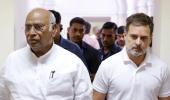'Unlike in the sporting arena, where sports federations moved from partisan to impartial referees, in Indian democracy's biggest festival, it appears we are moving backward from unbiased and objective to one-sided and partisan,' observes Nilanjan Mukhopadhyay.

It is extremely strange that assembly elections were called by the Election Commission of India in Maharashtra and Jharkhand barely a week after the results from Haryana and Jammu and Kashmir were declared on October 8.
Such rapid sequencing of polls, even though they could effortlessly have been held concurrently, is at odds under a regime that is in uncalled for hurry to roll out the contentious and fanciful One-Nation, One-Election project, placarded for long as panacea for a large set of India's woes.
There is little doubt that polls in Maharashta and Jharkhand were decoupled from the lot just completed, to benefit the ruling Bharatiya Janata Party.
Such scheduling was against the convention the ECI followed when it held polls simultaneously whenever possible.
In fact, this needless practice has seen recurrence in recent years, with the most notable 'separation' of election calendar being in 2017 when the Gujarat assembly polls were held separately from Himachal Pradesh even though the two states went to the hustings at the same from 2007 onwards.
This was done to enable the BJP leadership to focus solely on Gujarat where the party faced a grave challenge, telling underscored in its final tally dropping below 100 seats in the 182 member strong House.
Not content with completing polls in Haryana before Maharashtra and Jharkhand, these are further being held separately from the assembly polls in Delhi where elections are due in January-February 2025.
These could well have been advanced as demanded by former Delhi chief minister and Aam Aadmi Party leader Arvind Kejriwal.
Clearly, whenever the media or other neutral agencies embark on assessing and forecasting polls, a new 'factor' must be added -- with the 'prefix' of ECI.

The Commission is Constitutionally ordained to act as a 'neutral umpire'.
Unlike in the sporting arena, where sports federations moved from partisan to impartial referees, in Indian democracy's biggest festival, it appears we are moving backward from unbiased and objective to one-sided and partisan.
According to Article 172 (1) of the Constitution, whenever a state assembly or the Lok Sabha is constituted, its term, unless dissolved earlier, can be for a maximum of five years from the day fixed for its first meeting.
According to Section 15 of the Representation of People's Act, 1951 the ECI is to hold assembly elections in states -- unless the House is dissolved by the governor on the state government's recommendation -- anytime within the six months period before the term of the House ends.
Although the ECI, in rare cases, can hold elections within six months of the expiry of the term of the Vidhan Sabha, polls are usually held before the end of the term than afterwards; in any case, such scheduling does not provide a glittering example of a healthy democracy as the government remains in office, while the legislature's tenure is over.
In its hurry to draw up an electoral calendar that suits the BJP, the ECI has set apart too few days to complete the election process and for the new Maharashtra Vidhan Sabha to be constituted.

The term of the Maharashtra assembly ends on November 26 and counting has been scheduled for November 23. November 25 is listed by the ECI as the 'date before which election shall be completed'.
It is quite likely that House may not be constituted after completing due formalities within a day when the term of the current Vidhan Sabha ends.
This was one Constitutional slippage that the ECI could have prevented if it acted as per convention.
The ECI had actually no logical explanation for holding the Maharashtra and Haryana polls separately. It requires mentioning that the two states followed the same electoral calendar in 2014 and 2019.
In Jharkhand, polls were held separately over five phases in 2014 as well as 2019 for reasons of security, while peculiarly, this time the state will vote in two phases.
Does this mean that there has been a significant decline in security threat in the state?
If so, is this not the biggest endorsement by the Centre (BJP) of an adversarial state regime led by the antagonistic Jharkhand Mukti Morcha and Hemant Soren who was arrested on corruption charges?

Khera is flanked by Haryana party President Udai Bhan, former Haryana CM Bhupinder Singh Hooda, party General Secretary K C Venugopal. Ashok Gehlot, who was the party-in-charge, can be seen smiling in the background. Photograph: Ishant/ANI Photo
Having established that the ECI has entirely banished principles and logic and kowtows to the political necessities of the BJP, let us turn our gaze to why the party wished to complete the electoral process in Haryana (and Jammu and Kashmir) before venturing to campaign in Maharashtra.
In the Lok Sabha elections, in Maharashtra, the Congress-led Maha Vikas Aghadi won 31 seats while the BJP-led alliance, the ruling Mahayuti trailed with 17 seats.
In terms of vote share, the MVA polled a total of 43.91% plus the votes bagged by a victorious Congress candidate who contested as an Independent after the Uddhav Thackeray-led Shiv Sena (UBT) insisted on fielding its candidate from Sangli.
In contrast to MVA's showing, the Mahayuti bagged 42.73% votes. As can be discerned, the contest was extremely keen and went down to the wire.
In Haryana too during the Lok Sabha polls, the situation was somewhat similar. Although both the BJP and Congress won 5 seats each, the former's vote share stood at 46.11% while that of the Congress was 43.67%.
To the Congress vote however, there is need to add the 3.94% of votes that the AAP polled because it had an alliance with the Congress. This enhance the INDIA Bloc's combined vote to 47.61%.
In the first past the post system, vote share is often misleading and not the best indicator of 'success'.
However, on the basis of Lok Sabha elections, it was evident that Vidhan Sabha polls in the two states would be extremely tight and the BJP concluded that its energies should not be divided so the leadership could remain completely uni-focal during campaign of both.

Eventually, the BJP got the schedule it wanted and it scored over the Congress by micro-management of the campaign, while the latter languished because it mismanaged its own citadel and presented a disunited front.
Yet, if one places the Haryana assembly verdict under the microscope, it is clear that the contest was much tighter than the eleven seats that set the two rivals apart -- BJP at 48 and the Congress at 37.
In terms of vote share, the race was a photo finish -- the BJP's 39.94% to the Congress's 39.09% (and if the CPI-M's vote share is added because of their alliance, the total rises to 39.34%).
The Haryana assembly elections result is fairly similar to the Lok Sabha verdict in one crucial aspect.
Barring the odd braveheart or the rank risk-taker, everyone was convinced in Haryana that this was an election the Congress would not lose.
Not only was the Congress a resurgent force, but the BJP too appeared wracked by massive anti-incumbency arising from nothing-much-to-talk-about governance over a decade and a political narrative that didn't touch any of the core issues that mattered to the three most influential communities, Jawan, Kisan and Pehalwan.
Similar to the verdict in Haryana being the opposite of what was anticipated, the the Lok Sabha was also expected to yield a comfortable victory for the Narendra Modi-led BJP.
Barring odd naysayers, promptly dubbed as part of the 'left-liberal cabal' by champions of majoritarian politics, the consensus was that the election was over even before it was called.

The only point that required debating, prior to the counting of votes, was if the BJP would actually be able to cross the target set by Modi -- would it be 400 paar or not.
Eventually, it turned out that the vagaries of the first past the post system prevented a BJP majority even though its vote share did not decline appreciably -- down by just 1.2%, from 37.76% to 36.56%.
Likewise, the Congress almost doubled the number of seats in held in the outgoing House although its vote share increased by just 1.49% -- up from 19.7% to 21.19%.

More than four months after the Lok Sabha elections were declared, it is evident that the response to it from both quarters -- supporters of the BJP and Modi and their adversaries on the other side, was greatly exaggerated: The adversarial groups jubilated a shade more than what the mandate warranted, while the BJP and its affiliates went into a slump that was greater than the real picture.
The final numbers were greatly shaped by two states -- Uttar Pradesh when the INDIA Bloc forged a successful alliance and then stuck to the agreement and Rajasthan where the BJP's game came unstuck because of internal dissensions and poor micro-management.
As the results in Haryana showed, the BJP benefited by playing the Opposition's game it perfected during the parliamentary polls and the Congress failed to seize a victory which was theirs because they made several errors and allowed hubris to take over their mind.
Both the MVA and the Mahayuti in Maharashtra, as also the BJP-led NDA and the JMM-led (in Jharkhand) INDIA Bloc, need to remember that neither has the Modi-magic been restored to the levels of 2019, nor has it fallen to such a state that a victory is there for the asking.

Like for the Lok Sabha polls, when the Opposition worked assiduously while the BJP got taken in by Modi-driven hyperbole, in Haryana it was the turn of the Congress to be lulled into believing the confidence of Bhupinder Singh Hooda.
Like Modi during the parliamentary polls, the former Haryana CM believed that the polls had been won even before they were called.
The victory in Haryana has enhanced internal cohesion and morale of the cadre and they have put the setback of the parliamentary polls behind them. The Congress has to move on from this defeat and get its act together.
But eventually, both Maharashtra and Jharkhand will be decided by the astuteness of the two sides. The Opposition needs to be aware that mainly three factors have given the BJP and its allies a head start.
One, the BJP has settled matters among its allies in terms of seat share although the issue of the chief ministerial face remains undecided.
Two, the BJP's vastly greater reserve of resources leaves the Opposition with no option but to work harder.
But to succeed they have to draw from their experience in the Lok Sabha, how their leaders, especially in UP, went about turning the state's verdict upside down.
Three, the ECI Factor, to which there can be no counter for even if any of its decisions during the campaign are challenged in courts, it will be a long time before any verdict is delivered.
The Opposition must comprehend that the Commission's partisan role shall not end with scheduling of the elections to the BJP's advantage.
In Indian history, however, there are several instances when the Opposition overcame all odds and emerged victorious.
Nilanjan Mukhopadhyay is an author and journalist based in Delhi-NCR.
His latest book is The Demolition, The Verdict and The Temple: The Definitive Book on the Ram Mandir Project.
He is also the author of Narendra Modi: The Man, The Times.
Feature Presentation: Aslam Hunani/Rediff.com











 © 2025
© 2025